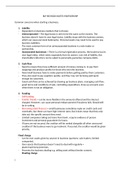Summary
Summary LPC - Business Law and Practice Notes
- Institution
- Manchester Metropolitan University (MMU)
This revision document is for the core BLP unit featured on the LPC. It is a comprehensive revision manual that strives to offer notes that are both clear and useful. Given that they summarise important subject areas that are frequently thoroughly evaluated on the LPC, these notes will be an extrem...
[Show more]



